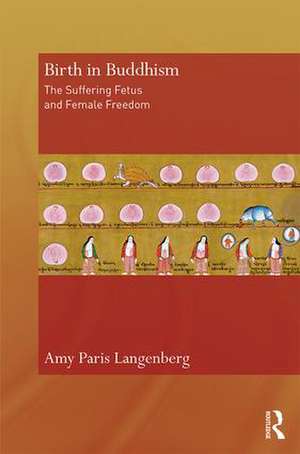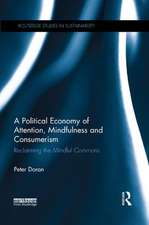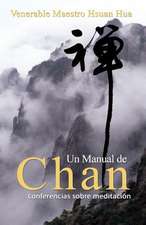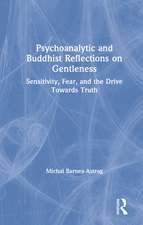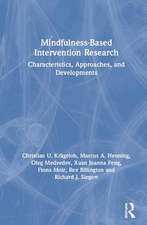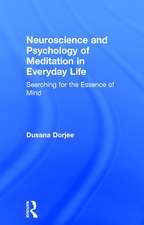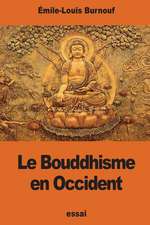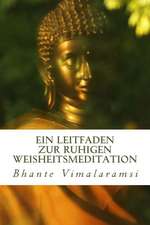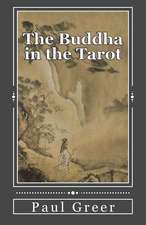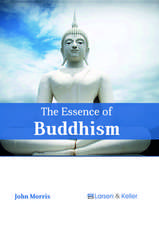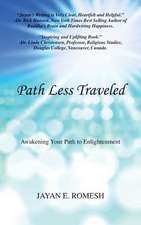Birth in Buddhism: The Suffering Fetus and Female Freedom: Routledge Critical Studies in Buddhism
Autor Amy Langenbergen Limba Engleză Hardback – 16 mai 2017
Eschewing the backward projection of secular liberal feminist categories, this book describes the basic features of the Buddhist discourse of the female body, held more or less in common across sectarian lines, and still pertinent to ordained Buddhist women today. The textual focus of the study is an early-first-millennium Sanskrit Buddhist work, "Descent into the Womb scripture" or Garbhāvakrānti-sūtra. Drawing out the implications of this text, the author offers innovative arguments about the significance of childbirth and fertility in Buddhism, namely that birth is a master metaphor in Indian Buddhism; that Buddhist gender constructions are centrally shaped by Buddhist birth discourse; and that, by undermining the religious importance of female fertility, the Buddhist construction of an inauspicious, chronically impure, and disgusting femininity constituted a portal to a new, liberated, feminine life for Buddhist monastic women. Thus, this study of the Buddhist discourse of birth is also a genealogy of gender in middle period Indian Buddhism.
Offering a new critical perspective on the issues of gender, bodies and suffering, this book will be of interest to an interdisciplinary audience, including researchers in the field of Buddhism, South Asian history and religion, gender and religion, theory and method in the study of religion, and Buddhist medicine.
| Toate formatele și edițiile | Preț | Express |
|---|---|---|
| Paperback (1) | 271.61 lei 6-8 săpt. | |
| Taylor & Francis – 12 dec 2019 | 271.61 lei 6-8 săpt. | |
| Hardback (1) | 766.31 lei 6-8 săpt. | |
| Taylor & Francis – 16 mai 2017 | 766.31 lei 6-8 săpt. |
Din seria Routledge Critical Studies in Buddhism
-
 Preț: 346.10 lei
Preț: 346.10 lei -
 Preț: 341.08 lei
Preț: 341.08 lei -
 Preț: 433.63 lei
Preț: 433.63 lei - 15%
 Preț: 397.61 lei
Preț: 397.61 lei -
 Preț: 419.63 lei
Preț: 419.63 lei -
 Preț: 382.76 lei
Preț: 382.76 lei -
 Preț: 486.17 lei
Preț: 486.17 lei - 18%
 Preț: 1330.16 lei
Preț: 1330.16 lei - 18%
 Preț: 1111.55 lei
Preț: 1111.55 lei -
 Preț: 482.53 lei
Preț: 482.53 lei - 13%
 Preț: 298.10 lei
Preț: 298.10 lei - 26%
 Preț: 820.21 lei
Preț: 820.21 lei - 25%
 Preț: 851.99 lei
Preț: 851.99 lei - 18%
 Preț: 1002.60 lei
Preț: 1002.60 lei - 18%
 Preț: 1059.84 lei
Preț: 1059.84 lei - 18%
 Preț: 1394.91 lei
Preț: 1394.91 lei -
 Preț: 468.36 lei
Preț: 468.36 lei -
 Preț: 486.42 lei
Preț: 486.42 lei - 18%
 Preț: 1010.26 lei
Preț: 1010.26 lei -
 Preț: 482.35 lei
Preț: 482.35 lei - 18%
 Preț: 1005.04 lei
Preț: 1005.04 lei - 18%
 Preț: 1224.24 lei
Preț: 1224.24 lei - 18%
 Preț: 1059.84 lei
Preț: 1059.84 lei - 25%
 Preț: 824.53 lei
Preț: 824.53 lei - 22%
 Preț: 322.89 lei
Preț: 322.89 lei - 18%
 Preț: 1057.40 lei
Preț: 1057.40 lei - 25%
 Preț: 131.51 lei
Preț: 131.51 lei - 25%
 Preț: 767.93 lei
Preț: 767.93 lei -
 Preț: 482.17 lei
Preț: 482.17 lei - 26%
 Preț: 821.46 lei
Preț: 821.46 lei -
 Preț: 483.33 lei
Preț: 483.33 lei -
 Preț: 391.39 lei
Preț: 391.39 lei - 18%
 Preț: 997.27 lei
Preț: 997.27 lei - 18%
 Preț: 1083.48 lei
Preț: 1083.48 lei - 18%
 Preț: 1387.26 lei
Preț: 1387.26 lei - 18%
 Preț: 1052.35 lei
Preț: 1052.35 lei - 18%
 Preț: 1114.98 lei
Preț: 1114.98 lei
Preț: 766.31 lei
Preț vechi: 1028.64 lei
-26% Nou
Puncte Express: 1149
Preț estimativ în valută:
146.65€ • 151.50$ • 122.05£
146.65€ • 151.50$ • 122.05£
Carte tipărită la comandă
Livrare economică 25 martie-08 aprilie
Preluare comenzi: 021 569.72.76
Specificații
ISBN-13: 9781138201231
ISBN-10: 1138201235
Pagini: 224
Ilustrații: 8
Dimensiuni: 156 x 234 x 20 mm
Greutate: 0.57 kg
Ediția:1
Editura: Taylor & Francis
Colecția Routledge
Seria Routledge Critical Studies in Buddhism
Locul publicării:Oxford, United Kingdom
ISBN-10: 1138201235
Pagini: 224
Ilustrații: 8
Dimensiuni: 156 x 234 x 20 mm
Greutate: 0.57 kg
Ediția:1
Editura: Taylor & Francis
Colecția Routledge
Seria Routledge Critical Studies in Buddhism
Locul publicării:Oxford, United Kingdom
Public țintă
PostgraduateCuprins
Reconceptions
1: Suffering is Birth
2: Birth Narratives and Gender Identity
3: Disgust for the Abject Mother
4: The Inauspicious Mother
5: Fertile Ascetics
6: Female Impurity and the Female Buddhist Ascetic
Postpartum
1: Suffering is Birth
2: Birth Narratives and Gender Identity
3: Disgust for the Abject Mother
4: The Inauspicious Mother
5: Fertile Ascetics
6: Female Impurity and the Female Buddhist Ascetic
Postpartum
Notă biografică
Amy Paris Langenberg is Assistant Professor of Religious Studies at Eckerd College, US.
Recenzii
"Brilliant analysis of suffering in early Indian Buddhist literature, highlighting its basic connection with birth and the impact of this connection on the lives of Buddhist men and women. With suffering and birth equated, woman were cast as sources of suffering, which in turn gave away to Buddhist literature of disgust that transformed 'the beautiful sexualized and fertile female form into something ugly and repugant."
—Rory Lindsay, Buddhadharma: The Practitioner's Quarterly
—Rory Lindsay, Buddhadharma: The Practitioner's Quarterly
Descriere
Eschewing the backward projection of secular liberal feminist categories, this book describes the basic features of the Buddhist discourse of the female body, held more or less in common across sectarian lines, and still pertinent to ordained Buddhist women today. The textual focus of the study is an early-first-millennium Sanskrit Buddhist work, "Descent into the Womb scripture" or Garbhāvakrānti-sūtra.
